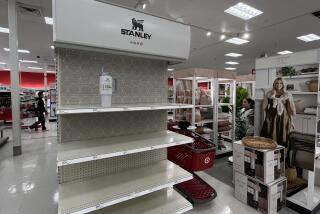War’s meaning? His cups runneth over
- Share via
Ehren Tool served in the Marine Corps for five years, three months and 20 days — first in the Persian Gulf, then as an embassy guard in Paris and Rome. Now he works in clay, which is perfect for dealing with war, he says. As with the experience and repercussions of combat, “it’s so immediate, but it lasts forever.”
Since 2001, Tool has been making stoneware cups imprinted with images and words relating to war and violence. There are photographs of massacres and lynchings, quotes by presidents, politicians and philosophers, visions of battle from artists across the centuries. There are also satirical takes on the motives behind the maneuvers, and portraits of Tool himself as a soldier.
Working out of the basement of his home in Berkeley, Tool, 42, has made 14,000 of the cups. More than 1,000 are on display at the Craft and Folk Art Museum in “Ehren Tool: Production or Destruction” through Sept. 9. Some have been sent to political and corporate leaders, with letters urging them to think deeply about the power they exercise over individual lives.
Tool has given most of the rest away, several hundred during June when he was in residence at CAFAM and set up a temporary studio just off the Wilshire Boulevard sidewalk.
“Every day there, at some point, I started crying with somebody,” he recalls, “as they told a story about their father or brother, about how the war affected their family. It was pretty intense.”
Tool’s father served in Vietnam and his grandfather in the Second World War. After his own stint, he went to college in L.A., where he grew up, and then to UC Berkeley for his master of fine arts degree. A mountain of a man with soft green eyes and a ready chuckle, Tool says his work isn’t about taking sides. Instead, it aims to raise awareness about what we, as a nation, are asking of our military when we send it to war.
“When I got out of the Marine Corps, I wanted to do something that I could believe in every day,” he says. “I may have crossed that line between productive and obsessive, but I don’t know what else to do about all the wasted opportunity to make the world a better place.”
The chasm he perceives between military and civilian cultures motivates him to make work that might narrow that gap, that would counter the romanticization of combat in video games and toys, and the depersonalization of killing in contemporary conflict.
Tool’s enterprise is a gentle form of activism, an intimate transmission of ideas and questions from his hand to another. Giving the cups away makes it clear that one thing Tool is not motivated by is profit. “I would sell them, I guess,” he laughs, “but it feels better tying the stories together.
“It makes all the cups more interesting to know Obama has a cup and some homeless vet in L.A. has a cup,” said Tool, who sent one to the president. “Seeing 1,100 cups on the wall is cool, but thinking of 14,000 cups out in the world, making conversations, is a lot more interesting to me.”
Tool will give a talk at the museum on Aug. 19 at 3 p.m.
More to Read
The biggest entertainment stories
Get our big stories about Hollywood, film, television, music, arts, culture and more right in your inbox as soon as they publish.
You may occasionally receive promotional content from the Los Angeles Times.








